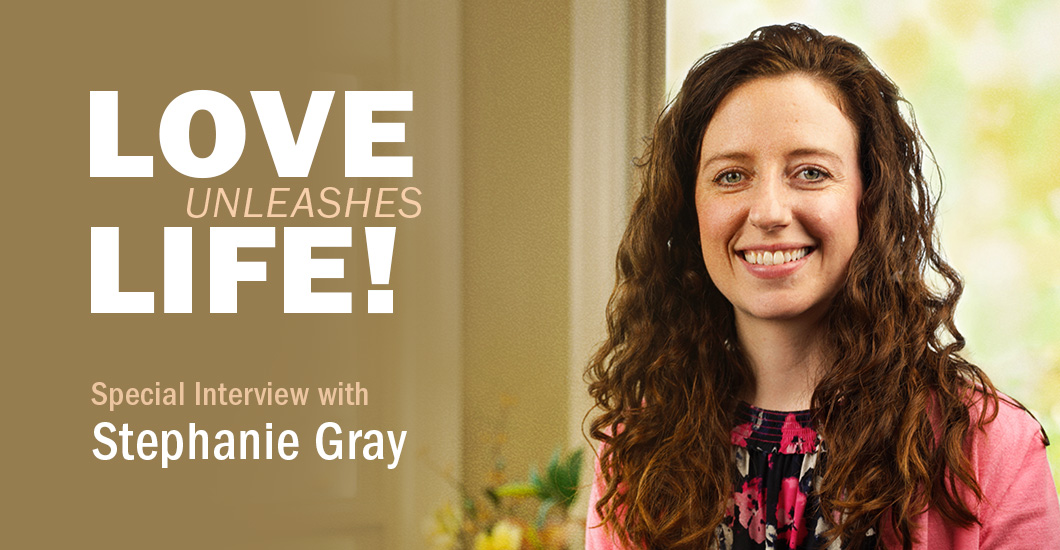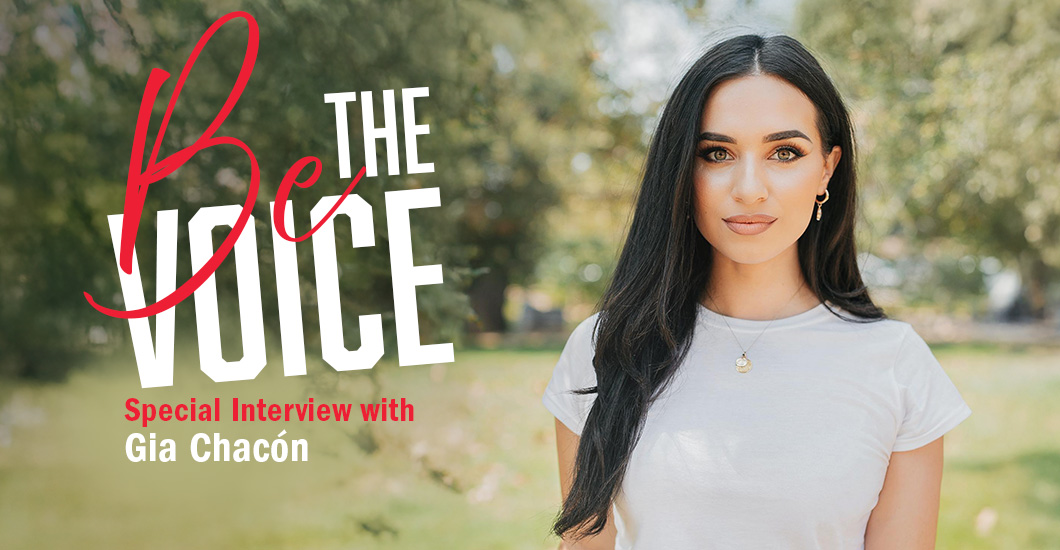Recent Interviews
Love Unleashes Life! | Stephanie Gray
Meet the viral Google speaker Stephanie Gray as she shares her experience as a pro-life activist and speaker
Both of my parents were very actively involved in the pro-life movement. My mom, a nurse, volunteered at a pregnancy care center. So, as a child, I played with fetal models and doodled while my mom was counseling. I’d visit the hospital with her when she went to give them post-natal support. We also accompanied them to conferences, marches, and protests at a local abortion clinic. That laid the foundation of a deep conviction about the horror of abortion and the need to speak out against it.
At university, I attended a pro-life conference where American speaker Scott Klusendorf taught us pro-life apologetics; not simply why we are pro-life, but how to articulate this in a winsome way to convince people who don’t share our beliefs, using science and philosophy. I was blown away by how reasonable his message was and wanted to teach others. Something Scott said that weekend stayed with me: “More people are working full-time to kill babies than there are working full-time to save them.”
He gave a seminar advising us on how to sustain ourselves so we could do pro-life work full-time. Once we knew how to fundraise, we started an organization to send young full-time workers and volunteers to directly engage the culture in high schools, universities, and even the public streets.
The pro-life message is so important because it supports the fundamental cell of society—the family. We advocate for the most vulnerable among us—preborn children, the disabled, and the frail and elderly—who are particularly endangered by the breakdown of families. In turn, the lack of regard and support for young children, mothers, marriage, and the elderly frays family bonds. We need to rebuild families because strong families can provide support for the most vulnerable and embrace life.
It shouldn’t surprise us that euthanasia and assisted suicide are becoming more acceptable, because approval for abortion has taught society that a needy human being who gets in your way is expendable. If the parents can get rid of a needy preborn child, their other children may apply the same mentality when their parents get old and needy.
We need to attack the idea that human life is the problem and is disposable. Certainly, we know that God is merciful. Whatever choices we’ve made, God can redeem them. God offers forgiveness and healing when we repent, but there are still consequences to the choices we’ve made. The increasing popularity of assisted suicide and euthanasia is one of the bad fruits of a generation that has learned that it’s okay to kill our relatives.
Power of Choosing Life
Pro-lifers are often asked about the use of abortion in the case of pregnancy resulting from rape or incest. Our first response needs to be compassion and sympathy for victims of sexual assault. I have several friends who have been victimized in that way, and we must acknowledge that they have been victims of injustice, of evil. There aren’t words to describe how vile that act is, and the victims need to receive compassion and support. But we also need to ask: “Will abortion un-rape the rape victim? Will it undo the trauma that has occurred?” In reality, it won’t. It won’t take away the original trauma. So then: “Is it fair to give the death penalty to an innocent child?” Even the guilty party doesn’t receive that consequence, even in states where the death penalty is legal. The possibility of the death penalty is for someone who commits murder, not rape in isolation. So we’re talking about giving a consequence to one of the innocent parties—the preborn child—that isn’t even given to a guilty party.
It can also be helpful to share the stories of women who have been victims of sexual assault and decided to carry to term. At the age of 12, Lianna Rebolledo was kidnapped and brutally raped for days. When the doctors discovered she was pregnant, they offered her an abortion. Remarkably, Lianna, at that tender age, had a profound question for the doctor. She asked: “If I have an abortion, will it take away all the terrible feelings? Will it make me feel clean?” The doctor had to answer that technically, the abortion wouldn’t do that. Lianna later said: “I just didn’t see the point. All I knew was that there was a life inside of me and that life needed me, and I needed her.” So, she not only continued her pregnancy to term, she raised her daughter. She essentially grew up with her daughter, and her daughter became her best friend. Lianna speaks about the power of choosing life in a very dark time, and there are many other stories like that.
In contrast, my friend, Nicole Cooley, had an abortion after becoming pregnant from rape. She told me that, “It was harder to heal from the abortion than the rape because I chose the abortion, I didn’t choose the rape.” Because rape victims have often been so traumatized, they cannot be blamed for the choices they make in that state. But those of us who have not been traumatized, who are outside parties aiding the victim, have a responsibility to be the voice of reason, not pressuring them into an abortion, but guiding them to a decision that’s not only right in the short-term but also in the long term.
Personhood
The topic of personhood is huge in the abortion debate and is often blended with the issue of when life begins. The term “human” is a scientific question, something that we can determine biologically with a genetic test. But the term “person” is not a scientific topic. I would say it’s a philosophical or a legal term, and throughout history, its definition has changed. There have been times when some people didn’t consider that women or black people were persons. During the Second World War, the Nazis didn’t consider Jews as persons. When a more powerful group in society wants to exploit or dismiss another group, they are unjustly denied basic human rights because they’re not persons due to some irrelevant feature—ethnicity, skin color, sex, or age.
They usually argue that the embryo at fertilization is not “rational, conscious, or self-aware,” on the premise that the embryo doesn’t have a brain, which is the organ we need to be rational, conscious, and self-aware. The embryo’s brain is already developing into its three parts at week four (from conception) and continues to develop even after birth. The embryo of human parents is biologically human, and if you think the embryo isn’t a person because he/she isn’t rational, conscious, or self-aware, that’s ultimately because of how old he/she is.
So, should the term “person” be grounded in being human, or should it be grounded in being a certain age? If we say it should be grounded in being a certain age, then how is that any different from saying that personhood should be grounded in your ethnicity, skin color, or sex? Those are all qualities that describe us but don’t define our right to life. Our right to life should be grounded in being human, not how old we are.
Conversation Methods
At the very beginning, when I learned pro-life apologetics, it was all about logic and argument, which is still fundamental, but as the years went on, I met many people who shared a lot of pain—coming from abusive homes, from great poverty…I found that their experience influenced their receptivity to the pro-life message. The more I heard their painful personal stories, the more I realized that it’s not just a matter of logic. It’s about really hearing where the other person is coming from and empathetically conveying sympathy to them. Even to set aside the logic and just sit with them in their pain, to seek to understand, as the prayer of Saint Francis says.
The more I did that, the more I was willing to set aside the arguments we had been discussing at length and say: “I’m so sorry for the suffering you’ve been through. What does someone who’s experienced such pain want someone like me to understand?” That can cause people to pause and think: “Oh, I don’t know. What do I want you to understand?”
I started to realize that it’s not just about winning an argument; it’s about winning the person, giving them a sense that the pro-life movement isn’t just standing with a bunch of placards. Behind those placards are people who care about people. We care about the person in the womb, but we also care about the person on the other side of the placard—that angry abortion supporter who might be yelling and swearing. If they begin to sense that we care about them, remaining compassionate even when they are harsh or angry, that witness alone will eventually have a profound effect. Over the years, I’ve come to see that we need to equip ourselves with both strong minds and tender hearts. That’s also where the premise of my ministry, “Love Unleashes Life,” comes from. If people experience authentic love, that will unleash life within them and save lives on a very practical level as well.
Impact of Faith
I usually use non-religious arguments looking at the issues from a human rights perspective. If we believe all humans are equal, if we believe everyone has the right to life, then whether someone is religious or not, they can be convinced using science, philosophy, and human rights that the preborn child is human and therefore has the same right to life that you or I have.
Having said that, faith in Jesus Christ and His Church is at the very heart of my belief system. Let’s be faithful to our Creator and how He created us. Think of a beautifully embroidered picture. On the back, all you can see is a bunch of knots. We’re like that; we see the back and not the big picture. Trust that He sees the full picture and submit to His direction.
I was very blessed to be raised in a happy home by parents who were both devout Catholics. They taught us the doctrines of the faith but also helped us develop a personal relationship with Christ and His Church. That grew deeper once I was at university because it became my choice to go to Church, or not. By God’s grace, I continued to go and sought answers to any questions I had.
That foundation has helped in my pro-life work, giving me the conviction to keep going when I get tired and want to give up. This isn’t about me or some humanist cause; it is for the Creator to build His kingdom on earth. Having spiritual direction and support and being nurtured by the Sacraments have been instrumental in allowing my work to bear fruit.
Stephanie Gray is an international pro-life presenter from Vancouver, Canada. To know more about her visit: loveunleasheslife.com.
Want to be in the loop?
Get the latest updates from Tidings!




